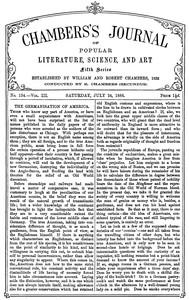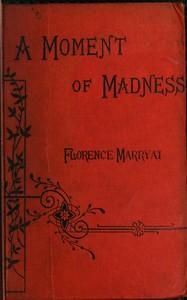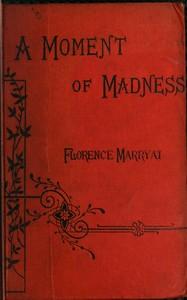|
|
Read this ebook for free! No credit card needed, absolutely nothing to pay.Words: 20274 in 5 pages
This is an ebook sharing website. You can read the uploaded ebooks for free here. No credit cards needed, nothing to pay. If you want to own a digital copy of the ebook, or want to read offline with your favorite ebook-reader, then you can choose to buy and download the ebook.

: Chambers's Journal of Popular Literature Science and Art fifth series no. 134 vol. III July 24 1886 by Various - Periodicals@FreeBooksMon 08 Apr, 2024 Release date: December 31, 2023 Original publication: Edinburgh: William and Robert Chambers, 1853 THE GERMANISATION OF AMERICA. Those who know any part of America, or have even a small acquaintance with Americans, will not have been surprised at the list of names published in the daily papers of the persons who were arrested as the authors of the late disturbance at Chicago. With perhaps one exception, there is not an English name among them; they are all foreign, and to the true American public, must bring home in full force the certain operation of a process hitherto only half apparent--that their country is fast passing through a period of incubation, which, if allowed to continue, will end in the development of a new Germanism, destroying the individuality of the Anglo-Saxon, and flooding the land with theories for the relief of an Old World discontent. Before steamships and railways had made travel a matter of comparative ease, it was customary to laugh at the peculiarities of our American cousins, in the belief they were the result of the natural growth of transatlantic life; but a wider knowledge of the continent has brought to light the indisputable fact that they are to a very considerable extent the habits and customs of the lower middle class of Germany. The true American, taking into consideration difference of thought, is as much a gentleman, from the English point of view, as the Englishman himself. If there is anything which characterises an Englishman, as distinct from the rest of his species, it is his sensitiveness on the point of similarity to his kind, and his willingness in carrying this out, to submit himself to personal inconvenience, rather than allow any singularity to appear. Where this comes in, the American does not bow to the same strict conventional rule, his constant activity and the dissimilitude of life having of necessity forced him to take circumstances into account. Laying aside the distinction, however, and it is one which does not always intrude itself, making allowance also for a greater conservatism which has retained old English customs and expressions, where is the line to be drawn in cultivated circles between an Englishman and an American? If, also, we look into the great upper middle classes of the two countries, who will grant that the dead level of uniformity in England is more attractive in its outward than its inward form; and who will doubt that for the pleasure of intercourse, the advantage is wholly on the side of America both as regards originality of thought and freedom from restraint? It would be easy to multiply questions proving the origin of supposed Americanisms; and indeed, the better classes are more tinged with continental ways than they might care to admit, as, for instance, the 'Pap-a' and 'Mam-ma' of well-born babies; or the Mrs Colonel and Mrs Dr So-and-so, like the Frau Pastor or Frau Doctor of Germany; but we have only desired to show how the foundation has been almost unconsciously laid for the naturalisation of European customs, and, as a consequence, of thought also, so that what is called American is really German. These ideas have been carried to America, of course, by the tide of emigration; and as the population grew out of the emigrants of all nations, native manners were partially lost by the lower orders. That America should be more Germanised than Irishised or Frenchified, is a tribute to the higher qualities of the Teuton; and that a certain class of Americans could become so transformed from its original type, only tells how completely it has been absorbed, and how far away it already is from the Anglo-Saxon race. That this is a matter of grief to all true Americans, is well known; and it is always said, whenever a case comes up, the man in question is a 'German American.' The tenacity of the Teuton has preserved his individuality under foreign conditions, and he now forms a distinctly powerful element in the country, lives the same way as if he were in Germany, thinks the same thoughts, and clings to his language. The American, true to trade instincts, has studied his wants and ministered to them, as, for example, in the consumption of Rio coffee, so that in a way he is responsible for the fostering of nationalities. Societies, too, representing these, formed on philanthropic grounds, everywhere exist; and though the man may call himself American, he is in reality partly Irish, Swiss, or Dutch. There is, therefore, a hard task before the American people--the necessity to weld into an harmonious whole European elements with long histories of animosity to each other, at all times more or less active, possessing Old World grievances that are inoperative in the United States, and bent upon maintaining their own ideas under the shelter of a common home. That measures will be taken to suppress the disturbances of divers nationalities whenever they occur against the American people, there is no doubt; but it is rather hard upon a new country to have to submit up to fighting-point to the airing of doctrines which do not affect it, and that might create artificial grievances causing endless trouble. In the attempt to banish national distinctions, to develop the Anglo-Saxon race, America has a firm friend here; and just as her truest sons, when desirous of looking beyond themselves, turn for their inspirations to the genius of the British people, so do we in return take a leaf from that chapter of events in the progress of humanity which it seems to be the mission of Americans to arrange. IN ALL SHADES. Twilight, the beautiful serene tropical twilight, was just gathering on Wednesday evening, when the negroes of all the surrounding country, fresh from their daily work in the cane-pieces, with cutlasses and sticks and cudgels in their hands, began to assemble silently around Louis Delgado's hut, in the bend of the mountains beside the great clump of feathery cabbage-palms. A terrible and motley crowd they looked, bareheaded and bare of foot, many of them with their powerful black arms wholly naked, and thrust loosely through the wide sleeve-holes of the coarse sack-like shirt which, with a pair of ragged trousers, formed their sole bodily covering. Most of the malcontents were men, young and old, sturdy and feeble; but among them there were not a few fierce-looking girls and women, plantation hands of the wildest and most unkempt sort, carelessly dressed in short ragged filthy kirtles, that reached only to the knee, and with their woolly hair tangled and matted with dust and dirt, instead of being covered with the comely and becoming bandana turban of the more civilised and decent household negresses. These women carried cutlasses too, the ordinary agricultural implement of all sugar-growing tropical countries; and one had but to glance at their stalwart black arms or their powerful naked legs and feet, as well as at their cruel laughing faces, to see in a moment that if need were, they could wield their blunt but heavy weapons fully as effectively and as ruthlessly in their own way as the resolute, vengeful men themselves. So wholly unsexed were they, indeed, by brutal field-labour and brutal affections, that it was hard to look upon them closely for a minute and believe them to be really and truly women. The conspirators assembled silently, it is true, so far as silence under such circumstances is ever possible to the noisy demonstrative negro nature; but in spite of the evident effort which every man made at self-restraint, there was a low undercurrent of whispered talk, accompanied by the usual running commentary of grimaces and gesticulations, which made a buzz or murmur hum ceaselessly through the whole crowd of five or six hundred armed semi-savages. Now and again the women especially, looking down with delightful anticipation at their newly whetted cutlasses, would break out into hoarse ungovernable laughter, as they thought to themselves of the proud white throats they were going to cut that memorable evening, and the dying cries of the little white pickaninnies they were going to massacre in their embroidered lace bassinettes. 'It warm me heart, Mistah Delgado, sah,' one white-haired, tottering, venerable old negro mumbled out slowly with a pleasant smile, 'to see so many good neighbour all come togedder again for kill de buckra. It long since I see fine gadering like dis. I mind de time, sah, in slavery day, when I was young man, just begin for to make lub to de le-adies, how we rise all togedder under John Trelawney down at Star-Apple Bottom, go hunt de white folk in de great insurrection. Ha, dem was times, sah--dem was times, I tellin' you de trut', me fren', in de great insurrection. We beat de goomba drum, we go up to Mistah Pourtal?s--same what flog me mudder so unmerciful dat de buckra judges even fine him--an' we catch de massa himself, an' we beat him dead wit stick an' cutlass. Ha, ha, dem was times, sah. Den we catch de young le-adies, an' we hack dem all to pieces, an' we burn de bodies. Den we go on to odder house, take all de buckra we find, shoot some, roast some same we roast pig, an' burn some in deir own houses. Dem was times, sah--dem was times. I doan't s'pose naygur now will do like we do when I is young man. But dis is good meeting, fine meeting: we cry "Colour for colour," "Buckra country for us," an' de Lard prosper us in de work we hab in hand! Hallelujah!' Free books android app tbrJar TBR JAR Read Free books online gutenberg More posts by @FreeBooks
: Sink or swim? by Houstoun Mrs Matilda Charlotte - English fiction 19th century@FreeBooksMon 08 Apr, 2024

: Sink or swim? by Houstoun Mrs Matilda Charlotte - English fiction 19th century@FreeBooksMon 08 Apr, 2024
|
Terms of Use Stock Market News! © gutenberg.org.in2025 All Rights reserved.






